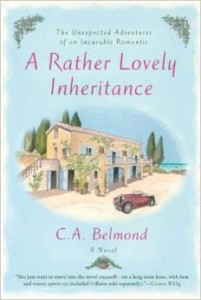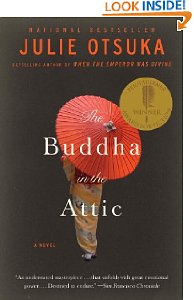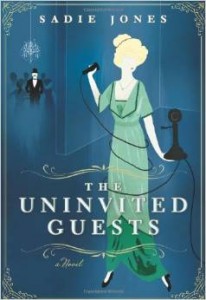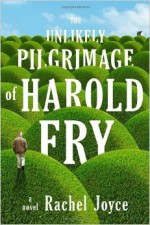A Rather Lovely Inheritance, by C. A. Belmond
Grab this book, cozy up under an afghan and brew a pot of tea. Just what I wanted, in front of the fire with holiday music on the radio. This is the first in a series and although predictable, it is, nonetheless, well written and simply  delightful.
delightful.
Penny Nichols (great name ha!) comes into an inheritance from a distant aunt – an antique car and a huge flat in London — but that’s just the beginning. There’s a fun romp across England, France, and Italy (all my favorite places). It has an amusing cast of family members, co-workers, and friends. There’s a little mystery, a little romance, a little danger and some mad capers on the coast of France. There are two more installments that I plan to read.
Probably falls into the genre of “chick-lit” but with a redeeming Anglophile/European slant.
The Buddha in the Attic, by Julie Otsuka
Oh, how I wa nted to like this small and elegant novel — finalist for the National Book Award and highly recommended by my friend Reiko (herself a Nisei and held in entournment camp).
nted to like this small and elegant novel — finalist for the National Book Award and highly recommended by my friend Reiko (herself a Nisei and held in entournment camp).
The novel uses the collective voice and sadly I found it distanced me from the women, their stories and their plights. I know the author got accolades and awards for this daring style but using the group to tell the individual stories left me wanting more — more connection with these nameless characters, more understanding of these woman as real people and more empathy with their heartbreak and struggles.
Sadly this was a book I did not finish and am quite sad about that, but it just wasn’t my cup of tea.
The Uninvited Guests, by Sadie Jones
I thought I k new what I was getting into with what appeared to be a cozy, gothic novel – however, the author employs a devious “switch and bait” to spoof the traditional genre.
new what I was getting into with what appeared to be a cozy, gothic novel – however, the author employs a devious “switch and bait” to spoof the traditional genre.
The Uninvited Guests starts out as a typical English manor house mystery – complete with an isolated dilapidated English estate, an elegant dinner party, and a dark and stormy night.
The characters are, on the surface, typically English Gothic novel stereotypes with spoilt children, a disinterested mother, and a father worried about money to keep up their manor, and the usual upstairs/downstairs “tempest in a teapot” crises.
Suddenly, as the house is preparing for a dinner party they get word of a nearby train crash and the house is put into service to host the survivors until the storm passes. One of the survivors is a strange and menacing man who has a connection with the mother and puts the rest of the family under his spell.
So far so good right?
The bewildered and confused passengers are cruelly locked into the drawing room where they become restless, mysteriously grow in number and become increasingly creepy.
There, I’ll stop – not to give away too much.
I must admit I enjoyed the first three-quarters of this novel – as it has good writing with a delightful setting, quirky characters, and unexpected plot twists. I especially enjoyed a scene involving the youngest daughter sketching a horse outline on her attic bedroom wall – again won’t reveal the full scene – laugh out loud, miraculous writing.
Up until the end, most was believable — albeit bizarre.
However, the ending left me shaking my head in horror and disbelief – as if Stephen King came in and high-jacked the last chapters. Read this book with that caution.
The Unlikely Pilgrimage of Harold Fry, by Rachel Joyce
 This charming novel starts with a small premise; recently retired, very ordinary Harold steps out his front door to mail a condolence note to a dying ex-coworker, only to turn away from the post box and decide to walk from his home in Northern England, 600 miles to her hospice.
This charming novel starts with a small premise; recently retired, very ordinary Harold steps out his front door to mail a condolence note to a dying ex-coworker, only to turn away from the post box and decide to walk from his home in Northern England, 600 miles to her hospice.
Why? Because, he believes, as long as he walks, Queenie Hennessey will live.
As the walk progresses, his story emerges –a dull life, a lost son, a wife who finds him extremely irritating and the co-worker Queenie who, alone, stuck up for him during a difficult work situation. Harold reflects on the waste and failure of his life. Sounds depressing – but read on – this is actually a bright, uplifting tale.
Harold has no appropriate walking gear, cell phone, or money which adds a very real (ouch – his poor feet) story line to his musings. As any hiker knows, it’s all about the feet. So we sympathize with his pain but also revel in his courage to carry on and on – just walking.
Harold meets quirky people along the way – the story shines with a cast of sympathetic characters. Moved on by their kindness he starts to look at his life differently, which resolves in a bitter-sweet but charming ending.
Favorite Quote: “Maybe it’s what the world needs. A little less sense, and a little more faith.”





